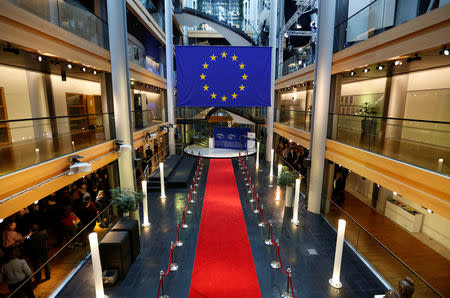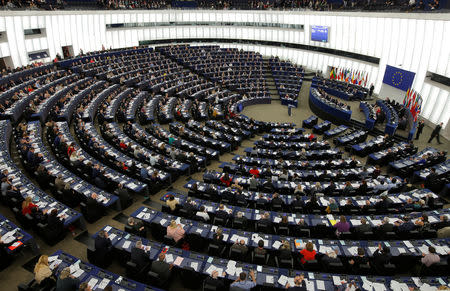Centre-right to top European Parliament vote, edging out nationalists: poll
By Alissa de Carbonnel BRUSSELS (Reuters) - The centre right is set to remain the biggest political group in the European Parliament according to the assembly's latest forecast of results from the upcoming elections, despite gains by eurosceptic nationalist parties. The projection published on Friday shows the EU legislature's two biggest parties - the European People's Party (EPP) and the Socialists - losing less seats compared to polls earlier this year in the May 26 ballot. The parliament's leaders say they are the heart of European democracy, elected in polls in each of the bloc's member states. Although EU national governments wield more power in the bloc's Brussels headquarters, EU lawmakers get a say in shaping new EU rules via a negotiated process with member states. The survey - excluding Britain, which is due to leave the bloc - confirmed earlier predictions showing far-right nationalist parties claiming more seats, with that of Italy's deputy prime minister Matteo Salvini making some big gains. The strengthening of nationalist sentiment, with liberals losing ground, foreshadows greater uncertainty in policy making as the largest groupings see their share of seats fall below 50 percent, which may force them to seek a broader coalition. The EPP is projected to win seven more seats compared to a previous forecast - although it will see its overall share of the 705-seat assembly drop from 29 to 27 percent. Socialists, the second ranking grouping in the Strasbourg parliament, would also increase their seats to 20 percent of the total from the past projection of 19 percent, but remain down from 25 percent in the current legislature. GERMAN CDU TO REMAIN BIGGEST NATIONAL PARTY German Chancellor Angela Merkel's Christian Democrat (CDU) party is expected to remain the largest national party in the next legislature, holding 33 of the EPP's forecast 188 seats. But the CDU is polling only just ahead of Salvini's anti-immigrant League, which is forecast to hold 27 seats. The League's advances - along with a projected increase in seats for Marine Le Pen's far-right Rassemblement National - could help boost the Europe of Nations and Freedom group to which they belong to 61 from 37 today. General dissatisfaction over slow growth and unemployment, an influx of migrants from outside Europe and security threats posed by Islamist militants have boosted support for nationalists in many EU member states. Popular support for Eurosceptic nationalists has surged in recent years amidst a backlash against migration over open EU borders and austerity policies imposed on some southern EU states as the price for financial bailouts. After the election and amid the pending exit of British lawmakers from the chamber, a shake-up of existing groups is likely before the new parliament sits on July 2. The polls should strengthen EPP party leader and CDU deputy Manfred Weber's bid to succeed Jean-Claude Juncker as president of the European Commission, the EU's executive. Weber, who enjoys Merkel's support despite his youthful years and lack of government experience, still faces challenges from EU Brexit negotiator Michel Barnier, a Frenchman, and the EU's top antitrust regulator Margrethe Vestager, from Denmark. He also faces opposition from many national leaders who after the election will make their own nominations for Juncker's successor to run the sprawling EU administration. (Reporting by Alissa de Carbonnel and Giulia Paravacini; Editing by Mark Heinrich)


